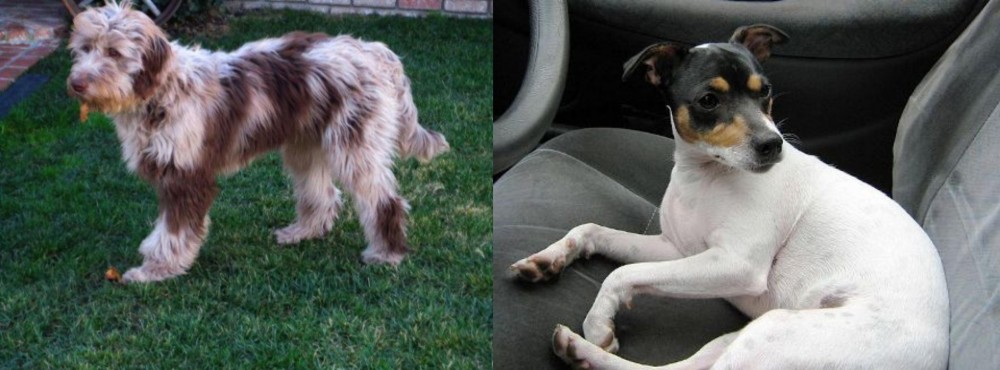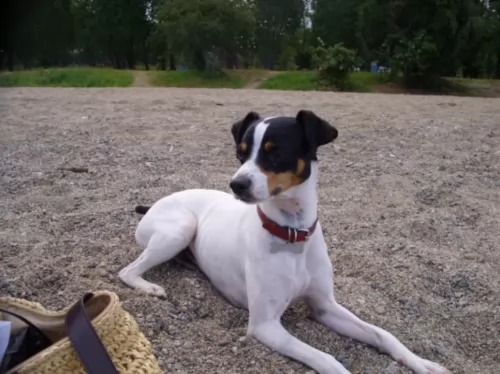 Petzlover
Petzlover Aussie Doodles is originated from United States but Chilean Fox Terrier is originated from Chile. Aussie Doodles may grow 10 cm / 4 inches higher than Chilean Fox Terrier. Aussie Doodles may weigh 22 kg / 49 pounds more than Chilean Fox Terrier. Aussie Doodles may live 3 years less than Chilean Fox Terrier. Both Aussie Doodles and Chilean Fox Terrier has almost same litter size. Aussie Doodles requires Moderate Maintenance. But Chilean Fox Terrier requires Low Maintenance
Aussie Doodles is originated from United States but Chilean Fox Terrier is originated from Chile. Aussie Doodles may grow 10 cm / 4 inches higher than Chilean Fox Terrier. Aussie Doodles may weigh 22 kg / 49 pounds more than Chilean Fox Terrier. Aussie Doodles may live 3 years less than Chilean Fox Terrier. Both Aussie Doodles and Chilean Fox Terrier has almost same litter size. Aussie Doodles requires Moderate Maintenance. But Chilean Fox Terrier requires Low Maintenance
 It is interesting to note that the Australian Shepherd doesn’t have much in common with the land ‘down under’. The dog has always been a popular companion dog in the United States as a working dog. As a hybrid, the Aussiedoodle is a new breed that doesn’t have a detailed history, but it is worth taking not that the 2 breeds that have been used to create the Aussiedoodle do have long histories each.
It is interesting to note that the Australian Shepherd doesn’t have much in common with the land ‘down under’. The dog has always been a popular companion dog in the United States as a working dog. As a hybrid, the Aussiedoodle is a new breed that doesn’t have a detailed history, but it is worth taking not that the 2 breeds that have been used to create the Aussiedoodle do have long histories each.
It is believed that the name of the Australian Shepherd is because the ancestors of the dog arrived from Australia in the United States and were named from where their ancestors previously resided. The Aussiedoodle has only emerged on the scene in the last 10 years and is becoming hugely popular. The breed isn’t recognized by the American Kennel Club but are recognized by the American Canine Hybrid Club.
 The Chilean Fox Terrier, developed in Chile, is a dog breed which comes from crossing the British Fox Terrier with some of the local Chilean dogs.
The Chilean Fox Terrier, developed in Chile, is a dog breed which comes from crossing the British Fox Terrier with some of the local Chilean dogs.
The dog is thought to have been developed in the 19th century already, some time between 1790 and 1850.
The dog is known for its skills in catching rats and mice. Known also as the Chilean Rat Terrier, Terrier Chileno or Ratonero, the Chilean Fox Terrier hasn’t achieved formal recognition with any of the leading canine organizations.
 The Australian Shepherd was bred to herd livestock together, and with the Aussiedoodle, you’ll still sometimes see this trait, and he may well try to herd his human family into the car. The Aussiedoodle can’t always be expected to look the same as they come in many sizes and shades of colour, some leaning more towards the Poodle and others more towards the Australian Shepherd. He is a medium- to large sized dog with a strong-boned, muscular structure.
The Australian Shepherd was bred to herd livestock together, and with the Aussiedoodle, you’ll still sometimes see this trait, and he may well try to herd his human family into the car. The Aussiedoodle can’t always be expected to look the same as they come in many sizes and shades of colour, some leaning more towards the Poodle and others more towards the Australian Shepherd. He is a medium- to large sized dog with a strong-boned, muscular structure.
The coat of the Aussiedoodle can differ somewhat, with most having wavy or curly hair while others have fairly straight hair. The dogs are available in many different colours, from solids to patterned and in shades such as black, grey, silver and blue merles. Size can vary too, depending on whether the Aussiedoodle had a miniature or standard poople involved with the pairing.
The Aussiedoodle is exceptionally clever and also very energetic. This dog breed will require training, socialization and exercise. Training an Aussiedoodle is easy as you will see he is eager to please.
The Aussiedoodle loves his family and this isn’t a dog that can be left outdoors all day on his own. He is lively and energetic, and left too long on his own, he can become bored and destructive. This hybrid makes the perfect pet for families with kids, with no aggressive tendencies. He can also be introduced to other pets in the home as he is a friendly, amicable breed who wants to please.
 The Chilean Fox Terrier looks almost identical to his ancestors. He stands between 30 – 40cm and weighs between 5 to 9kg.
The Chilean Fox Terrier looks almost identical to his ancestors. He stands between 30 – 40cm and weighs between 5 to 9kg.
He is squarely proportioned, he is athletic looking and well muscled with long, slender legs. Many of these dogs are born with naturally short tails, but if not, then the tail is usually docked after the first or second vertebrae. Now that docking is falling out of favor, the breed is losing that distinctive look.
The head of the Chilean Fox Terrier is triangular with the muzzle being somewhat shorter than the Smooth Fox Terrier. The ears of the Chilean Fox Terrier are smallish and high set, being partially erect. The coat of the dog is short and thick and essentially white while the face is usually tan and black.
The Chilean Fox Terrier is loyal with his human family and can fit in well with a family where there are children and other pets.
Training and socialization become necessary for the dog so that he becomes obedient and amicable around his family and with strangers. He isn’t an aggressive dog but he is alert and can make an excellent watch dog.
He is dominant and confident and also intelligent and easily trainable. He is an active dog so he will require exercise every day, whether he lives in the city or in the country.
 The Aussiedoodle is an intelligent, outgoing, patient and devoted family pet who will happily slot into any home where there are children and other pets.
The Aussiedoodle is an intelligent, outgoing, patient and devoted family pet who will happily slot into any home where there are children and other pets.
Most Aussiedoodles love being active and you’ll want to include him in all your activities – walking, swimming, ball games and herding.
Yes, it is true that the temperament of your Aussiedoodle will depend on the canine parents but he will also be influenced by your lifestyle and environment too.
 The Chilean Fox Terrier is a lively dog with an alert expression. He has become a popular companion dog, being less aggressive than other Terriers.
The Chilean Fox Terrier is a lively dog with an alert expression. He has become a popular companion dog, being less aggressive than other Terriers.
When you treat him well he becomes a loyal friend and forms a strong bond with his human owners. He gets on well with children who have been taught to respect animals, but he tends to become a bit aggressive around other dogs of the same sex.
Socialization and training however can make him much more relaxed around other dogs.
He is an attractive little dog with his short coat, giving the appearance of being well groomed. He can adapt to country- or city life too. He is such an easy dog to keep too so why not choose him as your 4-legged family member? He promises to make the perfect family companion.
 As with most mixed-breeds, Aussiedoodles are a healthy breed, and your pet won’t come with any hereditary ailments. Both Australian Shepherds and Poodles have few inherent diseases, and by mixing the two, you get a robust breed.
As with most mixed-breeds, Aussiedoodles are a healthy breed, and your pet won’t come with any hereditary ailments. Both Australian Shepherds and Poodles have few inherent diseases, and by mixing the two, you get a robust breed.
Having said that, you always have to be aware that any dog, including your Aussiedoodle can inherit certain health problems of both the Poodle and the Australian Shepherd.
The Australian Shepherd is susceptible to vision problems and some health problems with the Poodle include epilepsy, renal disease and cancer, but in spit of this, the good news is that there aren’t many documented health issues with Aussiedoodles.
Always research and find a reputable breeder of Aussiedoodles who has certificates that the parents are sound and free from common health defects. Make sure that you get your puppy vaccinated from 8 weeks of age to avoid the common, deadly canine diseases that can rob you of your puppy. The very first vaccination will be for distemper, measles and parainfluenza.
 The Chilean Fox Terrier is a healthy breed who doesn’t appear to have any particular health issues. It doesn’t mean that your dog will be free from disease, but it is worth knowing that a quality diet, fresh water and lots of love and attention does enhance longevity in a pet.
The Chilean Fox Terrier is a healthy breed who doesn’t appear to have any particular health issues. It doesn’t mean that your dog will be free from disease, but it is worth knowing that a quality diet, fresh water and lots of love and attention does enhance longevity in a pet.
It is to your benefit to know about one or two common diseases that your dog could get.
You’ll notice your pet’s stomach being swollen. Bloat is a disease which can become dangerous because the stomach can twist. Once this happens, gas can’t escape from the stomach and your pet will want to vomit, he’ll salivate and you’ll notice unusual restless kind of behavior. You need to get him to the vet as soon as possible.
This is also a disease that any dog can develop and can be a complication of another pet disease such as Lyme disease. One of the first signs of kidney disease in dogs is drinking more often than usual and also urinating more often.
He’ll lose his appetite and be lethargic and likely lose weight. Kidney disease is a serious disease and you will need to get your pet to the vet as soon as possible.
 The coat of Aussiedoodles need minimal maintenance. This is because of the Poodle input which is a low shedding dog. Aussiedoodles shed very little, but you will still need to give your dog a regular brush every other day to remove loose hairs and to also prevent matting. You can even include some professional grooming as his thick coat can quickly look dirty and unruly.
The coat of Aussiedoodles need minimal maintenance. This is because of the Poodle input which is a low shedding dog. Aussiedoodles shed very little, but you will still need to give your dog a regular brush every other day to remove loose hairs and to also prevent matting. You can even include some professional grooming as his thick coat can quickly look dirty and unruly.
Brush the teeth of your Aussiedoodle with special dog brushes and toothpaste to prevent plaque forming. You can also book an appointment at your local vet to have his teeth cleaned if you are reluctant to do it. it.
An Ausiedoodle under 6 months of age should be fed 3 or 4 times daily. Once your Aussiedoodle is 1 year of age you can cut the meals down to 1 or 2 meals a day.
Always select high quality foods and understand the labels and ingredients. Cheaper foods with ‘bad’ ingredients can mean more medical bills because of malnutrition.
Speak to your vet about feeding your Aussiedoodle. You can also prepare cooked meals for your dog and include chicken, meat, rice and vegetables. Remember this is a high energy dog and he will require foods high in protein to meat his daily energy and nutritional requirements.
 The Chilean Fox Terrier is a low maintenance breed and this means you won’t be having to part with any money on grooming sessions for him. He’ll basically require a brushing twice a week.
The Chilean Fox Terrier is a low maintenance breed and this means you won’t be having to part with any money on grooming sessions for him. He’ll basically require a brushing twice a week.
The Chilean Fox Terrier, as a smaller dog breed, will also require regular dental brushing, as neglecting this can result in dental problems as well as a host of diseases that are associated with gum disease and tooth decay.
Make sure to feed him a quality diet full of vitamins and minerals and ensure he always has fresh, cool water available.